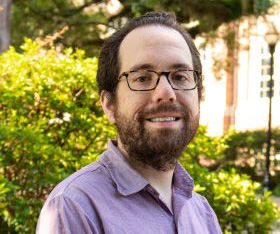Nicholas Ruhs, Ph.D

Nicholas Ruhs
Research Data Management Librarian
Florida State University, Tallahassee, Florida
PhD, Chemistry, Washington University in St. Louis
BS, Chemistry, Quincy University
Nicholas Ruhs has a penchant for problem-solving. He once had a student ask him to help track down a scientific paper from the 1980s that was cited in another paper they were using for a research project. But the citation was incomplete. With only a limited amount of information to go on, he found the full citation in another paper, which led him to the article he was after. “That was one of those moments when I thought, ‘Yes, I can be a librarian,’” he recalls.
Ruhs came to his current career as a research data management librarian at Florida State University (FSU) by way of a chemistry education. As an undergraduate at Quincy University, Ruhs majored in chemistry and completed two Research Experiences for Undergraduates (REU) programs. He then earned a PhD in chemistry from Washington University in St. Louis where he used organometallic chemistry to develop catalysts for renewable energy applications.
In his current role, Ruhs helps researchers with a range of challenges—from tracking down papers to archiving data. The best part of the job, says Ruhs, is working with students and faculty and staying connected to the field.
Graduate school really is a great time to figure out what you do and don’t want to do for your future career.
Why did you decide to pursue a PhD in chemistry?
I initially wanted to be a chemistry teacher or professor at a small college focused on undergraduate teaching, so I thought a PhD would help me pursue those careers. Also, I knew that I enjoyed research because I had completed two REU programs that each gave me a sense of what it feels like to tackle a research project. During one REU program at the University of Kansas, for example, I worked in an organic chemistry lab that was synthesizing new ligands.
When did you start considering a career in chemistry librarianship?
When I was nearing my dissertation defense, I started to think about what I really wanted to do with chemistry. I liked teaching, but I didn’t want all of the pressure to publish and secure grant money that goes along with a tenure-track position and running my own lab. I also wanted a job that would allow me to get out of the lab more and help people.
I began working with a career coach at my university who helped me realize that I wasn’t just limited to being a professor or going into industry—there were many paths that I could take, including chemistry librarianship. I spoke to some of the science librarians at my school to learn more about what they do. Their careers sounded interesting, and I realized that they were supporting research using many of the skills that I had already developed as a chemist.
Graduate school is a great time to figure out what you do and don’t want to do for your future career.
How did you build the skills to become a research data management librarian?
From my chemistry training, I already had experience teaching and working with students. I understood the research process, including data analysis and management. And I was able to collaborate and be a good teammate.
A lot of the nuances of librarianship, like understanding how to access our journal collections, I picked up on the job. I probably had more of a learning curve than someone with a library background, but I had a lot of support from my department at FSU. I also did a lot of professional reading, attended conferences and webinars, and took advantage of other professional development and mentoring opportunities.
The ACS Division of Chemical Information was also hugely helpful. I’ve been a member since I began this role in 2018. The division has helped me connect with a network of colleagues who have taught me so much about the profession. I've met a lot of folks there who made similar transitions.
What are your responsibilities?
I help faculty and students in the chemistry, statistics, computer science, and scientific computing departments here at FSU to access the resources that they need for their research. Often, I help them find journal articles or books. But I also help them access publicly available data sets from government agencies or other researchers. I also advise them on how to manage their own data and, ultimately, how to make it publicly available to the research community.
Sometimes I consult with researchers individually. I also visit classes to teach them about our library’s resources and how best to manage their data.
I really like the variety. As a grad student, you’re often working on a very specific project within a subfield of chemistry. Now I get to see a broader view of the field.
Do you have any advice for chemists who are also interested in exploring academic careers off the tenure track?
Really think about what your skills are and what you like about chemistry. Do you like the research process? Do you like teaching? Do you like collaborating with others? Then explore how your interests could fit into other jobs. I considered everything from being a career advisor to working in administrative offices on campuses. With a chemistry degree, you can take on a lot of different roles in academia.
This profile has been edited for length and clarity. The opinions expressed in this interview are the author's own and do not necessarily reflect the view of their employer or the American Chemical Society.

